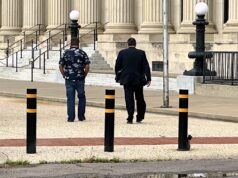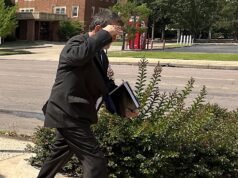

(Editor’s note: The following article about a civil defamation lawsuit contains references to a racial slur and to court documents that have been temporarily hidden on the Oklahoma State Courts Network during trial.)
MUSKOGEE — In a defamation trial pitting a former football coach against the state’s largest newspaper, a former reporter for The Oklahoman admitted last week that only one of his two confidential sources actually confirmed his story, which incorrectly identified Scott Sapulpa as the man who uttered a racial slur during the broadcast of a 6A girls playoff basketball game in 2021.
In addition, sports reporter Cameron Jourdan’s other source, whose identity was revealed in the course of litigation, denied in testimony that he said he knew Sapulpa was the announcer who went on an expletive-filled rant when Norman High School players took a knee during the national anthem.
Because The Oklahoman incorrectly named him as the offensive speaker, Sapulpa brought the civil defamation lawsuit seeking compensatory and punitive damages. After a first week that featured testimony from the newspaper’s executive editor, its managing editor and others, the trial begins its second week in Muskogee County District Judge Jeffrey Payton’s courtroom today.
Matt Rowan, the play-by-play announcer whose company broadcast the tournament game online, eventually issued a statement admitting that he, not Sapulpa, was the person who made the racist rant. Rowan blamed the episode on a blood-sugar issue, an excuse that generated further outrage at a time of increased discussion about racism in America.
During the national anthem of the Norman-Midwest City girls basketball game, audio of Rowan’s hot-mic diatribe was captured on livestream video that went viral. Sapulpa was Rowan’s broadcast partner for the game.
“They’re kneeling? Fuck them. I hope Norman gets their ass kicked,” Rowan said.
Sapulpa asked about the kneeling: “Are you serious?”
After clarifying team uniform colors, Rowan continued.
“Fuck them. I hope they lose. Come on Midwest City,” Rowan said. “They’re going to kneel like that? Hell with them. They even saluting the flag? Some of them aren’t. Fucking n*****s.”
The next day, March 12, 2021, Jourdan’s story on The Oklahoman’s website inaccurately identified Scott Sapulpa as the person making the hateful comments. In his lawsuit, Sapulpa claims the publication defamed him and damaged his reputation.
“It basically went nationwide, and as you can imagine it went viral, as everyone will agree,” Sapulpa’s attorney, Michael Barkett, told jurors during opening statements in the trial last week. “The motivation for all this is the way they make money. The wider the viral spread goes, the more they can tout the breadth of their scope for advertisers and make more dollars.”
The Oklahoman’s lawyer, Bob Nelon, described the mistake in his opening statement as a “temporary error,” and he said the reporters and editors had reported what was told to them.
“The error was promptly corrected when more information became available,” he said.
‘Get in on this traffic party’: A peek behind the newsroom curtain
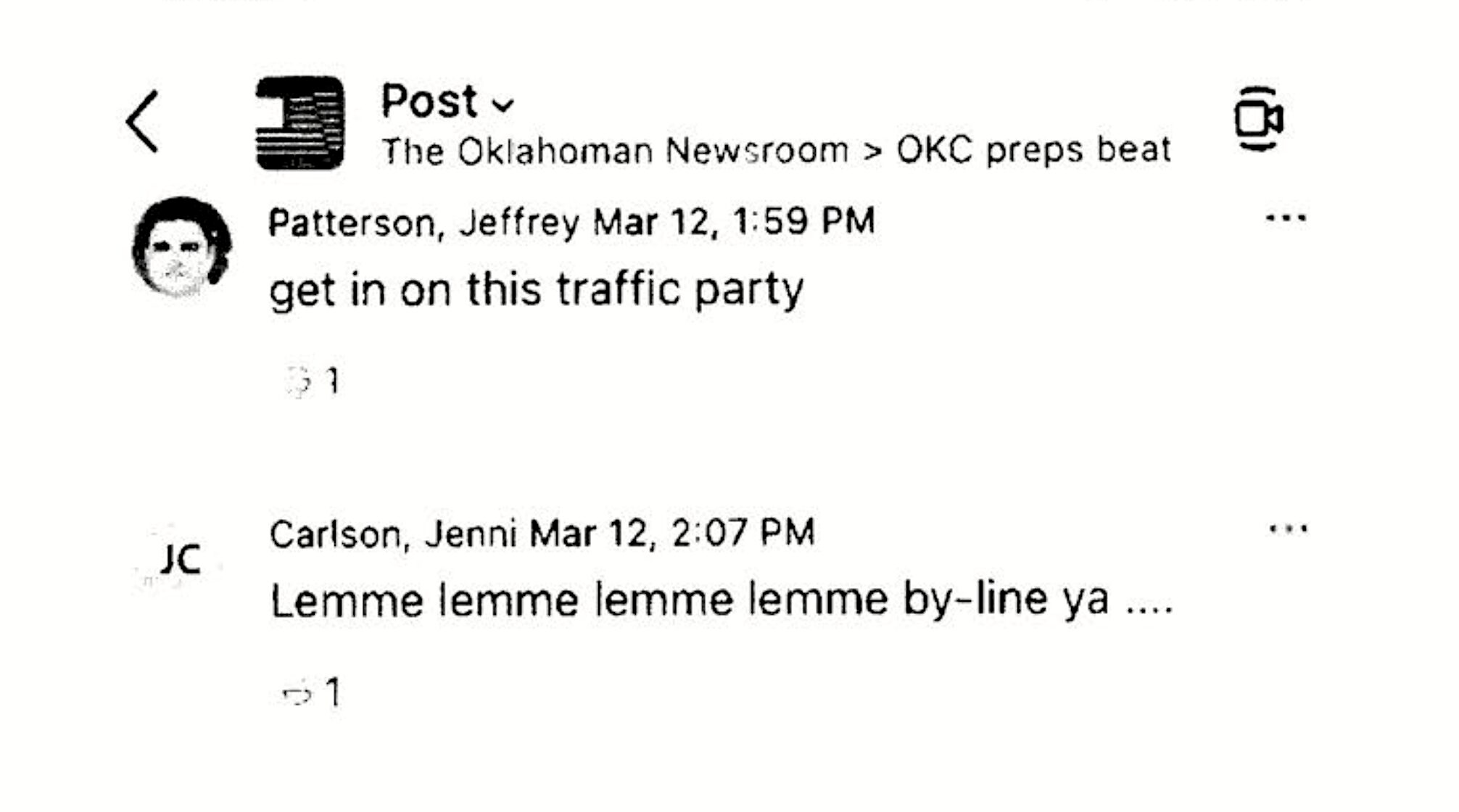
The defamation case’s trial testimony, exhibits and pretrial pleadings offer a rare behind-the-scenes view of the state’s long-time newspaper, which has been owned by Gannett Co., Inc. since 2019 when it merged with the newspaper’s prior owner, Gatehouse Media. Gannett is the nation’s largest media company, operating nearly 1,000 weekly newspapers and more than 100 daily newspapers, including USA Today.
Beyond Gannett and Jourdan, Sapulpa also named Rowan, CBS Sports, and Nuria Martinez-Keel — a former Oklahoman reporter who shared a byline on the story — as defendants when he filed his suit. However, all defendants except Gannett have been dismissed.
Sapulpa’s lawyers contend that The Oklahoman hurriedly published its story without adequately confirming its accuracy, misrepresenting that journalists had confirmed sources and failing to talk to Sapulpa before publication. They allege that, once published online, the story spread like wildfire in mainstream and social media.
“Scott was labeled a racist. He was labeled ‘vile,’” Barkett said.
Jurors have seen a Microsoft Teams transcript of The Oklahoman’s internal chat messages from the day the story published. The chat transcript (embedded below) details reporters’ and editors’ activity before publishing the story, when they updated it to say “multiple” sources had identified Sapulpa as the offending speaker, and after the accuracy of their identification was questioned.
The publication’s chat shows editors Ryan Sharp and Jeffrey Patterson working with Jourdan, then-columnist Jenni Carlson and eventually Martinez-Keel and reporter Jacob Unruh to publish the story at 11 a.m. Minutes later, Jourdan chatted that the announcers were from Lawton, a statement that proved to be untrue.
“We don’t need to say where we got the name. We just need one so that we can confirm it with the OSSAA,” Carlson stated at 11:27 a.m. “We can’t let this guy weasel back into the shadows. There are kids in Lawton whose games he’s likely calling. They deserve better.”
While other conversations between the journalists occurred outside of the Microsoft Teams chat, the transcript shows Jourdan saying he “may have a name” at 12:23 p.m. After being told by Sharp that they needed it “verified by two sources,” the story was updated at 12:37 p.m. to include Sapulpa’s name.
“The announcer, identified by multiple sources as Scott Sapulpa, was hired by the Oklahoma Secondary Schools Activities Association and was broadcasting on the NFHS network,” read the online story.
About 30 minutes later, Jourdan alerted his editors to feedback that his facts were wrong.
“I’ve had a couple people try to reach out and say ‘it’s not sapulpa, it’s the other guy.’ Who’s name is Matt Rowan, who owns the streaming site. But again, I have it from two people it was Sapulpa,” Jourdan wrote. “I also don’t know why people would assume it’s the other person when they wouldn’t come out and say who it is if they supposedly knew, so.”
At 1:51 p.m., Sharp asked Patterson and Jourdan if they needed to update the story to note “conflicting reports” about the speaker’s identity.
“I think we do,” Jourdan responded. “Seems there’s a group of people saying he was there but it wasn’t him. Yet they won’t say who it is.”
Minutes later, after local reactions she obtained were added to the article, Martinez-Keel asked in the chat, “Can ya girl get a byline now?”
Patterson, The Oklahoman’s sports editor, replied affirmatively at 1:59 p.m.
“Get in on this traffic party,” Patterson said.
At 2:26 p.m., the story was updated to reflect Sharp’s concern about accuracy.
“But, conflicting reports emerged Friday afternoon on social media about his involvement,” the update read. “Sapulpa, who couldn’t be reached for comment, deleted his Twitter account and a Facebook post showing he was calling games at Sapulpa High School on Thursday.”
At 3:05 p.m., The Oklahoman’s executive editor had Sapulpa’s name removed after more readers questioned its accuracy. Still, the story made even more national headlines when it was distributed through the USA Today network and picked up by other media outlets, such as CBS Sports.
Owing to the falsehood’s wide circulation, Sapulpa’s lawyers claim he has sustained more than $1 million in reputational damages. But in the trial last week, The Oklahoman’s lawyers contended that Sapulpa was only identified in the online story for about two and a half hours and that the updated versions from which Sapulpa’s name was omitted were the ones that received most of the national attention.
Source: ‘There could have been a misunderstanding’
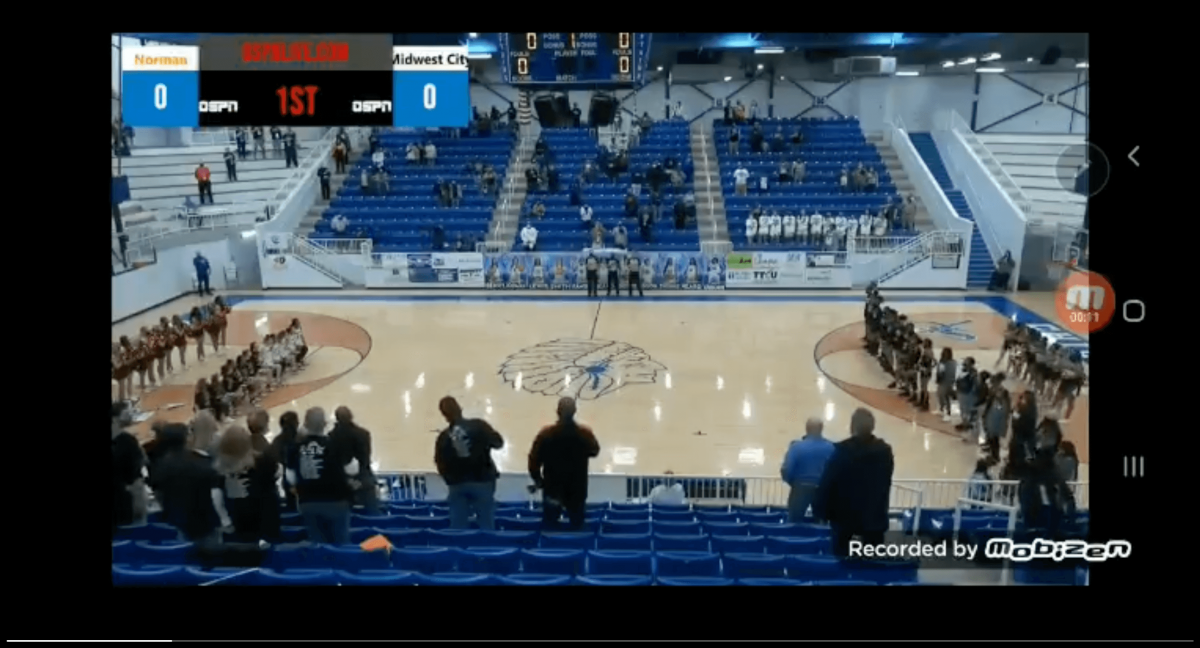
The lawsuit has demonstrated how media outlets’ use of confidential sources can sometimes lead to trouble. The Oklahoman’s lawyers contend that its reporters reasonably relied upon official sources. Early in the lawsuit, The Oklahoman refused to reveal the names of its sources, but during the course of discovery, two persons — the executive director of the OSSAA and a Tahlequah public school athletic director — were identified as having spoken to Jourdan. However, both denied telling him that Sapulpa was the offending speaker.
Jourdan, who became a sports reporter at The Oklahoman in 2019, worked on the story identifying Sapulpa while he was also covering state basketball tournament games in the Tulsa area. Jourdan is now a writer for Golfweek, a Gannett sports magazine.
Jourdan and other witnesses for The Oklahoman testified last week that the hot-mic racial slur was a major breaking news story warranting immediate attention, particularly in light of the national discourse about race-related events like George Floyd’s murder. After Jourdan was told by Sharp that he needed to have two confirmed sources to publish Sapulpa’s name, Jourdan telephoned David Jackson, the executive director of the Oklahoma Secondary School Activity Association.
Testifying on Thursday, Jourdan said he told Sharp that Jackson was one of his sources regarding Sapulpa’s name but that he wanted confidentiality. However, Jourdan testified in a deposition and at trial that Jackson had not specifically identified Sapulpa.
“After my conversation with David Jackson, I came away with the idea that Scott Sapulpa was one of the commentators at the game,” Jourdan said Thursday.
On Friday, Jackson likewise testified that he had not identified Sapulpa as the specific broadcast crew member making the statements.
Jourdan testified his second source was Tahlequah Public Schools Athletic Director Matt Cloud, who was familiar with the broadcast crew. Cloud’s name arose when he had issued a public statement that day stating the broadcast crew in question had worked previous Tahlequah basketball games, but that their contract would be canceled. The statement did not identify any broadcaster by name.
Jourdan said he telephoned Cloud, whom Jourdan claimed “adamantly” identified Sapulpa.
“I introduced myself as to who I was. I told him why I was calling, because of his statement. Then I asked him if it was Scott Sapulpa who made the racist comments. He said, ‘Yes.’ He also said he had spoken to OSSAA and they had told him that information as well,” Jourdan testified. “And he said he talked to Matt Rowan, the other broadcaster, and Matt Rowan also told him it was Scott Sapulpa.”
Cloud testified last week that he issued the public statement on behalf of Tahlequah schools under the mistaken belief that one of the broadcast crew had been a Tahlequah teacher who had previously worked games for them.
“Obviously, I was appalled that anybody would say that, especially with the reach of social media,” Cloud testified. “Saying it alone was bad enough. Say it on social media and it reaches the world.”
During his testimony Wednesday, Cloud denied that he told Jourdan whom the speaker had been, but he said he may have told Jourdan he “heard” it was Sapulpa, claiming that he meant he had seen reference to Sapulpa among a barrage of social media posts.
Cloud said he was responding to Jourdan’s own suggestion that Sapulpa had been the man making the racist comments. He said he only knew who Sapulpa was through coaching circles, but that he had never had a conversation with him and did not know he was at the Norman-Midwest City game.
“I should have said that ‘I saw’ the same thing (on social media), instead of saying I’d ‘heard’ the same thing,” Cloud told the jury. “There could have been a misunderstanding, absolutely.”
But later in his testimony, Cloud said he was unsure if he had seen any social media posts naming Sapulpa prior to his phone call from Jourdan.
“It’s been three years ago. I don’t remember the details of it,” he said.
Jourdan testified that he called Cloud a second time after speaking to Rowan but before Rowan ultimately admitted to being the offending speaker. In the second call, Jourdan told the jury, Cloud apologized for misleading him.
Cloud’s trial testimony supported the plaintiff’s claim that The Oklahoman’s reporter had been untruthful, but it also contradicted a central theme of Sapulpa’s case — that it was The Oklahoman’s publication that first identified Sapulpa and drew widespread attention that harmed his reputation.
Sharp, then The Oklahoman’s news director and now its managing editor, testified Wednesday that it was Gannett’s policy for editors to approve any promises of confidentiality. However, he did not recall having that conversation with his reporter.
Jourdan said he believed his sourcing of the story was sufficient.
“When the story originally was published — I would never publish something I didn’t believe — I came to find out the story was incorrect,” Jourdan testified.
Reporter’s ‘multiple sources’ placed in doubt
In a 24-7 digital news environment, the Sapulpa v. Gannett libel lawsuit has also demonstrated the risks journalism publications face when quickly posting online stories about breaking news.
Joel Kaplan, a Syracuse University journalism professor, testified as an expert witness for Sapulpa on Friday, giving his opinion that The Oklahoman reporter had “offered up” confidentiality to the sources, contrary to Gannett’s own policy that required an editor’s approval. Kaplan is a former investigative reporter for the Chicago Tribune and was a reporter for Gannett’s Nashville Tennessean from 1979 to 1986.
Kaplan said The Oklahoman had also not met standards of the profession when it fell short of verifying the accuracy of Jourdan’s reporting, calling the situation one of the “most egregious” examples of journalistic malpractice that he had ever seen.
Kaplan said he believed Jourdan had guessed about the accuracy of the story and disregarded red flags. He was critical the newspaper’s failure to contact Sapulpa before publishing and for not following up after one failed attempt, especially as conflicting reports emerged.
Earlier in the trial, Jourdan had testified that he first heard of Sapulpa as a possible announcer at 12:20 p.m. when a Tulsa World reporter texted him a screenshot of Sapulpa’s Facebook page in which Sapulpa said he was helping with the broadcast at the same gymnasium the previous day. However, the screenshot did not specifically say he was attending the Norman-Midwest City game.
Sharp testified that his instruction to Jourdan about “two sources” meant they needed “first-hand knowledge” of the information.
Jourdan said he called Sapulpa’s cell phone number before naming him in the story, but he got no answer and the voicemail box was full, so he was unable to leave a message.
Sharp testified he was unaware at the time that one of their relied upon sources, OSSAA’s Jackson, had not specifically identified Sapulpa to Jourdan as the offending speaker, but rather had merely said Sapulpa was part of the broadcast crew.
When questioned on the stand by Sapulpa’s lawyer, Sharp said The Oklahoman published what it believed to be true.
“I believed what my reporter was telling me,” Sharp testified.
Barkett, the attorney, responded: “And now you know it was false.”
“Part of it,” Sharp replied from the witness stand.
Asked whether the reporter had enough confirmation to publish Sapulpa’s name, Sharp testified: “I felt like [Jourdan] felt he had enough to tell me he did.”
The Oklahoman updated the story 12 times on the afternoon of March 12, 2021, finally posting a version that said Rowan admitted to being the speaker and that the newspaper had earlier misidentified Sapulpa based on sourcing.
“What the hell is going on with this shitshow?” Carlson asked in the chat at 4:53 p.m. “Someone from the OSSAA or NFHS needs to say who this joker [was].”
As others discussed how to update the story following Rowan’s admission, Carlson further decried the speaker.
“This knucklehead made all of this week’s state tournament about his racism. I’m mad at him for what he said about the Norman girls, but I’m mad for all the other kids that his racism stole the spotlight from,” Carlson chatted at 5:04 p.m. “I’ve had some wine. Just some. But feel free to take that into account when reading my comments.”
During the two and a half hour window in which the online story named Sapulpa, The Oklahoman began receiving social media messages and direct messages that questioned the accuracy of their story. Only 11 minutes after the story posted, one tweet came from a woman who said she knew the voices on the video and that she did not believe Sapulpa was the man who used the racial slur.
Jourdan replied to her, stating he had two people who “directly told me who it was, including someone involved in the hiring process of announcers.”
“So I’m confident in my reporting,” he wrote. “I wouldn’t put anyone’s name out there unless I knew. That’s not fair to anyone.”
But at the trial last week, Jourdan said his reply that two sources “directly” identified Sapulpa “could have been worded better” because he was “busy trying to cover basketball games and responding quickly.”
The reader replied with a video clip of the game’s conclusion, where the play-by-play announcer identified himself as Matt Rowan. Jourdan told the jury that he did not look at that video.
Similarly, Muskogee-area coach Bobby Klinck messaged that Sapulpa was not the announcer making the racist comments. Ryan Aber, one of Jourdan’s fellow sports reporters at The Oklahoman, said he was hearing the same from people in the Tahlequah area.
By text message, Jourdan replied to Klinck that he had three people confirming the reporting.
“Three was a mistype. I meant to say two and typed three,” Jourdan testified. “I was covering a basketball game.”
At 1:48 p.m., The Oklahoman’s chat transcript shows the editors were aware that Tulsa television reporter Cayden McFarland had posted on Twitter that he had spoken to Rowan and was told the announcer in question was not Sapulpa.
The Oklahoman updated its story to say there now were conflicting reports about the speaker’s identity, but it continued to name Sapulpa based on “multiple sources.”
“They defiantly continued to publish despite having the information that they had the wrong guy,” Barkett said in his opening statement.
‘Too much of a hurry in a competitive situation’
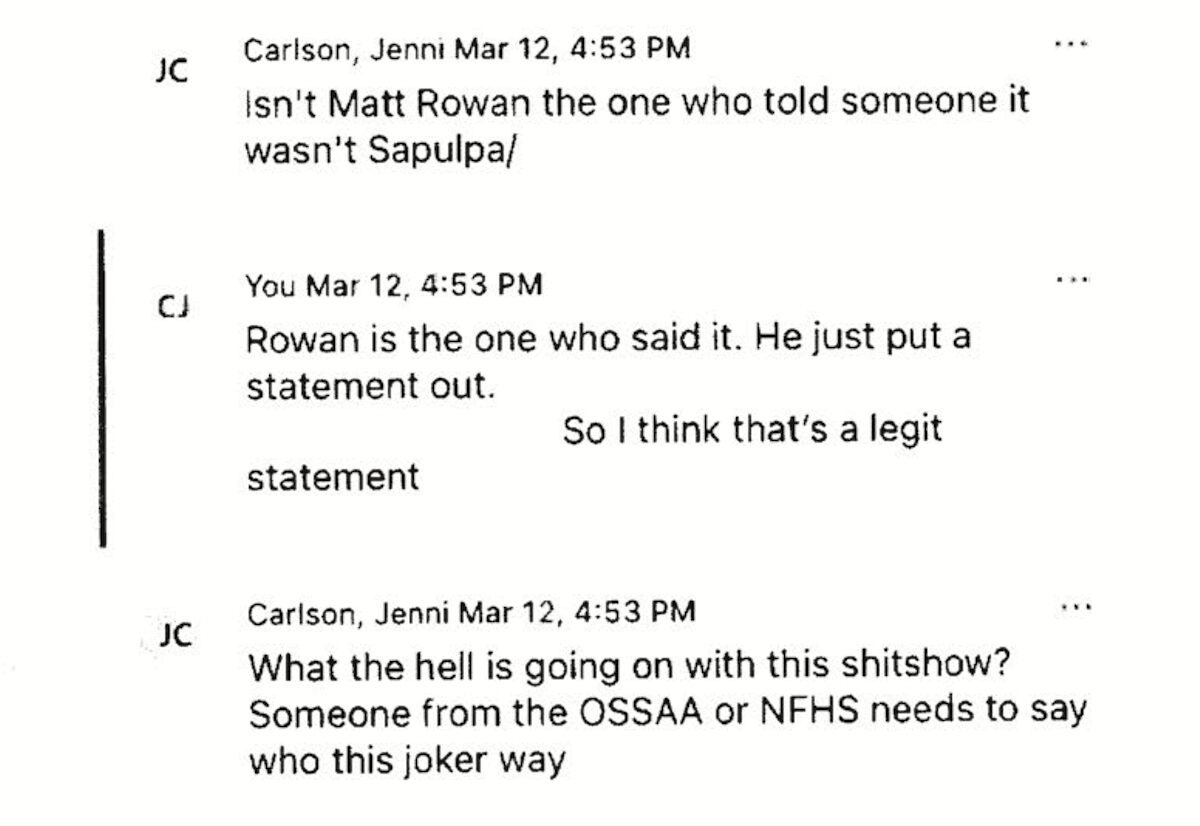
The March 2021 story came only two weeks after Gannett had named Ray Rivera its new executive editor for The Oklahoman. Rivera was still living in Seattle, where he had been managing editor of the Seattle Times, when he began working remotely for the Oklahoma City newspaper. At 2:30 p.m. on March 12, he summoned editors and reporters working on the story for a “catch up” conference call.
Rivera testified Tuesday afternoon and Wednesday morning, telling jurors that when he learned some readers questioned the identity of the offensive speaker and that Jourdan’s sources were confidential, he directed the editors to remove Sapulpa’s name from the online story unless the sources agreed to be publicly named. Jourdan also deleted his own Twitter posts linking to the previous version of the story.
The story was updated at 3:05 p.m. to remove Sapulpa’s name, although it implied The Oklahoman had never identified him.
“Multiple sources identified the person that uttered the racist remarks as a former high school football coach, but The Oklahoman is not disclosing that person’s identity until it can be confirmed on the record,” the updated story read. “Attempts to reach the person identified have been unsuccessful.”
Despite that update, Carlson lauded Jourdan in a chat message at 4:38 p.m.
“Someone needs to nominate Cam right now for whatever recognition we can muster. The weekly national note from whoever in Gannett. A special best of month from [Clytie Bunyan],” Carlson wrote. “I don’t care. Dude is at the end of the toughest two weeks of the year …and he cranked this story AND got the racist’s name AND drove to Tulsa AND covered games AND got what may end up being the best scene-setting lede of the year. Damn. Damn, Cam.”
Shortly before 5 p.m., Rowan released a public statement admitting that the racial slur had been his. The Oklahoman story was updated again, with the final version at 6:18 p.m. making no reference to Sapulpa and ending with a correction.
“The Oklahoman in an earlier version of this story identified an individual as the person who made the racist comments, based on official sources who were familiar with the incident. That information was incorrect,” the story concluded.
That evening, The Oklahoman’s then-managing editor, Don Mecoy, sent a text message to Jourdan that is now an exhibit in the trial.
“I just want to make sure you know you did nothing wrong today,” Mecoy told Jourdan.
“You worked your tail off to get the news, and then your editors — particularly me — did you a disservice. We got in too much of a hurry in a competitive situation,” Mecoy said. “It’s on us, not you, that we printed an inaccuracy.”
‘You racist piece of S-H-I-T’
The focus of the trial now turns to the damages claim by Sapulpa, who did not push back on Rowan’s hateful speech during the hot-mic incident. Sapulpa is expected to testify this week that he received abusive threats and that a sports equipment company he operated lost business.
Barkett said in a pretrial hearing that one of several messages his client received said: “I hope you die slow of cancer, you racist piece of S-H-I-T. You’re a piece of S-H-I-T. I hope you rot in hell and lose everything.”
In his opening statement, Barkett said his client faced extensive backlash.
“He’s been emotionally wrecked. Ashamed. Placed in fear for his life,” Barkett said.
Meanwhile, The Oklahoman’s lawyers have listed an expert medical witness expected to challenge Sapulpa’s claim of emotional distress. In addition, they have listed Sapulpa’s ex-wife, Leslie Mullin Sapulpa, the sister of U.S. Sen. Markwayne Mullin, as a witness to testify regarding Scott Sapulpa’s reputation prior to the story’s publication.
Last week, Eric W. Rose, a Los Angeles crisis and reputation management expert, testified for Sapulpa that it would take a minimum $860,000 to hire a digital public relations firm to buy advertising and distribute enough positive internet content about Sapulpa to suppress his name from showing up on Google searches related to the basketball game.
Rose said more than 70,000 readers clicked on The Oklahoman’s story, but that he had also done a Critical Mention analysis to determine the spread of the story on the internet. He said 813 related stories were reprinted and available online.
However, on cross examination by the newspaper’s lawyer, Nelon, Rose said 429 of those stories referred to Rowan as the offending speaker and did not mention Sapulpa. He said only 118 included Sapulpa in the story, but that some had corrected the reporting that he had been the announcer. Regardless, Rose said, the stories that connected Sapulpa to the racial slur had reputational harm of more than $1 million.
“I don’t think his reputation will ever be completely repaired. But what you can do is suppress what people find out about Scott on the internet,” Rose said.
In an effort to minimize the breadth of the impact on Sapulpa’s reputation, Nelon introduced evidence of other regional and national media stories, including NonDoc’s reporting, to show that most media outlets had not copied The Oklahoman’s inaccurate reporting or named Sapulpa. The Oklahoman’s print version of the basketball incident story also did not identify Sapulpa.
Sapulpa is also seeking punitive damages in the case and contends that, because of the egregious nature of The Oklahoman’s conduct, statutory caps on punitive damages should not apply.
Read The Oklahoman chat transcript
 Loading...
Loading...
(Correction: This article was updated at 1:22 p.m. Monday, Jan. 29, to correct reference to Ray Rivera’s title at the Seattle Times.)












